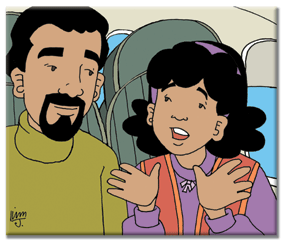
Spreading the Gospel
“Even out here in the jungle, we still have to go to school,” Vivian complained one morning as she dropped her books on the desk.
Mother smiled. “At least it is just for the morning,” she said. “If you weren’t in the jungle, you would have to go to school all day.”
In the afternoon the girls were supposed to play quietly together or do independent study while Mother taught the Indian school.
The afternoons seemed to be getting longer for Leona. She had read every book she could find. She had often dreamed of living next door to a library, but here in the jungle she couldn’t even visit a library! One afternoon she noticed Muriel reading a book she hadn’t seen before.
“Where did you get that book?” Leona asked Muriel.
“From one of the boxes in Mother’s bedroom.”
“What box? Which box? Where is it?” Muriel shrugged her shoulders and continued to read.
“Tell me where it is,” Leona said.
Muriel frowned, but finally she put down her book and took Leona into the bedroom. She opened a box that was full of books Leona hadn’t read before. Some of them looked like textbooks and some were history, but Leona didn’t care. She was ready to read anything!
She sat on the floor and buried her nose in one of the books. She didn’t even know how much time had passed until Mother came into the room.
“What are you doing?” Mother asked.
“Mother, why didn’t you tell me you had these books?” Leona complained. “I’ve been looking all over for something to read.”
“Why, I, uh.” Mother looked very surprised. “I guess I just didn’t think you would be interested in any of the books in that box.” She shook her head and threw her hands up in the air. “If you want to read them, it is certainly fine with me. Just put them back in the box when you get through.” Mother smiled and left the room.
For the next few days Leona happily carried a book wherever she went. The twins began to complain that she wasn’t any fun anymore, but Leona didn’t care. She ignored them when they teased her. In the afternoon she would take a book and go down by the creek, where it was cooler. One day she found a little hollow along the bank that the water had washed out when the creek was higher. When Leona sat on a rock in the hollow, she had a perfect place to read, where no one could even find her. She still wished she could have more friends among the Indians, but as long as she had something to read she was content.
Although it was cooler now than it had been in the middle of the hot, dry “summer” season, it still hadn’t rained much. Usually there was a dry season, like summer, and then a wet season, like spring or fall. There wasn’t any real “winter” out in the jungle. After another trip into the jungle, Dad came home rather concerned.
“Some of the creeks and streams are getting pretty low,” he told the family. “Our paddle boats hit sandbanks that we have always been able to paddle over before. We almost got stuck a few times. I sure hope we get some more rain.”
“I don’t like the rain anyway,” Leona said. “It always makes everything drippy and damp.”
“It also makes everything grow,” Dad reminded her. “If we have a drought here and everything dries up, you will be wishing it would rain. You might even find out what it’s like to go without food if it gets bad enough.”
The days went by until the middle of what should have been the wet season in the jungle, but everything was still very dry. It would start to rain every once in a while, and then everyone would rush outside to feel the cool wetness. But each time it would only rain for a short time. It would hardly get the top of the ground wet and wasn’t enough to water the garden and the plants. Without the rain, the jungle started to dry out and be hot and stifling. Leona decided it was better to be hot and wet than to be hot and so dry.
Dad was spending most of his time now trying to translate the Bible into the Indian language. He had a natural gift for languages and learned very easily to speak the Indian language. However, it was harder for him to translate the written word, especially when he wanted to make sure he had the right words and the right meaning.
When Dad wasn’t busy translating, he traveled around and visited other Indian villages. Sometimes he took the rest of the family with him. They enjoyed going to visit the other villages, although sometimes the trails were pretty difficult.
On Sabbath the family usually stayed at the mission station. The few times that Dad was gone, Mother would preach. But she preferred to have Dad preach. Almost all the Indians in the nearby villages would come. The chief’s wife was very crippled with arthritis and could hardly walk. At first the chief would have someone help him carry his wife to church, but one day he noticed the four girls playing with a wagon Dad had built. He spoke to the girls very excitedly in his language, but they couldn’t understand him. Finally they went to the mission house to get Dad, with the chief following them.
The chief talked to Dad in a mixture of English and Indian, and soon Dad was laughing and nodding his head. Then Dad turned to the girls.
“Chief Fransico would like to barrow your wagon on Sabbath.”
“What for?” Vivian asked. “Is he going to play with it?”
“Don’t be silly,” Leona said. “We don’t even play with it on Sabbath.”
“No,” Dad said. “He’s going to use it for transportation.”
Next Sabbath the chief’s wife rode in style to church, sitting in the little wagon. She was delighted with the arrangement, even over the rough jungle trail. The wagon made it easier to get to church.
Leona enjoyed going to church. It was really just an open chapel, with the whole left side without walls, except for the poles that held up the roof. She would sit there on the rough wooden bench and look out over the jungle and down the path to the creek. Everyone sat very still in church. Even Leona knew better than to wiggle around very much on those benches. They were slip logs with the round side down, resting on another notched log so they wouldn’t roll. But the split side wasn’t sanded smooth! There were plenty of little slivers just waiting to poke into you if you moved around.
The best part of church was the singing. The Indians loved to sing. They would sing in their language, and the four girls would sing in English. Sometimes Leona would listen to the Indians. It was strange hearing a song she knew well with different words.
Her favorite song was “In the Sweet By and By.” Only when the Indians sang, they said, “Ser’indak, ser’inkdak, Ina amra Jerusalem bo.”
Leona sang, “In the sweet by and by, we will meet on that beautiful shore.”
As she looked down over the little creek and its beautiful shore, she wondered how the shore in heaven would look. Thinking about heaven made her smile. Yes, there would be a beautiful shore there, but even better, everyone would speak the same language. She wouldn’t have to worry about not being able to understand her friends. There wouldn’t be any problem making friends in heaven!
With the dry weather continuing, the family began to run short of food. Mother tried to have one of the Indians bring some cows to the mission from Venezuela, but Jaguars killed most of them. Then the last one just disappeared.
“That was a total disaster,” Mother admitted to Dad. “I think some of the Indians took the last cow and killed it for food. But you can’t blame them; they were probably hungry.”
Everyone was hungry now. Food supplies were running out, and there weren’t any stores around. For the first time in her life, Leona found out what it was like to go to bed hungry.





